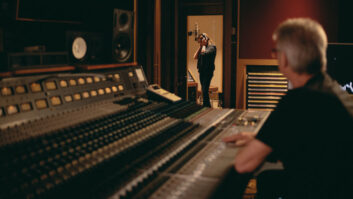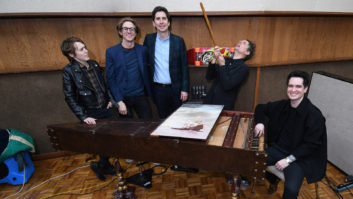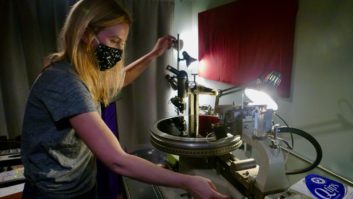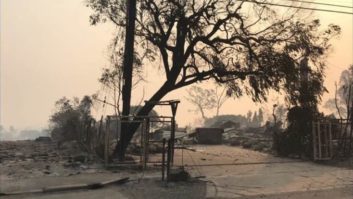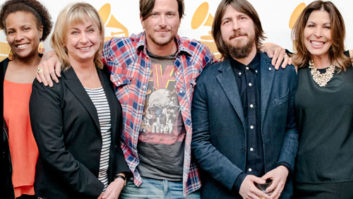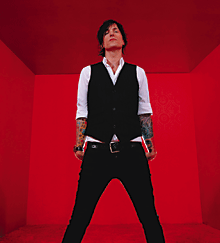

Butch Walker has a hard time standing still. It’s not a medical thing; it’s a demand issue. The singer/songwriter/producer/engineer is jumping between gigs with Avril Lavigne (Under My Skin, et al), Pink (I’m Not Dead), The Donnas (Gold Medal), Sevendust (Seasons), Bowling for Soup (several albums), Supernova (Rock Star) and The Bronx (Bronx) while writing his own music — his latest, The Rise and Fall of Butch Walker and the Let’s-Go-Out Tonites, was released in the summer of 2006 — and touring.
When Mix caught up with him, Walker was walking down the busy (and loud) streets of Boston before heading into soundcheck at the nightclub Axis. Walker is not a new kid on the block. Rather, his first dive into the spotlight came in the early ’90s with a handful of bands that included Southgang and Marvelous 3. His success continued with a run of solo albums. His pop-inflected brand of rock music influences the work that he does with each act, but never overrides the band’s natural sound.
How is life as a multi-hyphenate?
There are too many hyphens to be involved with and I’m trying to figure it out. It’s good, though; I like it. It’s a good problem to have.
Is it difficult to balance?
Not really, because when I was off the road, which was rare through the ’90s, I was always in the studio. I just didn’t have any desire to sit around and play videogames, [although] I played this videogame called “Pro Tools” that could be hazardous to your career if you lose. I was recording and it was just something that I did. It was a good balance for the ego and for [returning to] sanity [after] touring.
How busy are you these days? Are you taking gigs and working on them while on the road?
I have been turning down more work than I have ever turned down. That’s a good problem to have. One thing about being on tour and being able to make my own records and do my day job, which is producing records, is that I can afford to do whatever I want.
Have you found yourself in the midst of a production gig being inspired to go back and work on one of your own songs?
Rarely do I do a genre of music with someone in the studio that is what I do for myself. So it’s not so much that as maybe just picking up on people’s little tricks, because everybody is different and everybody has a different sense of work ethic and routine. Instead of always making everybody do things the way I do them in the studio, it is nice to be an open book a little bit, and just say, “I’m going to watch you guys for a couple of days and see how you work.” That way, I can pick up on some cool stuff.
At the same time, you’re pretty active in shaping songs for artists. You did that for The Donnas record, right?
Yeah, we went in very heavy-handed on the front end of pre-production to make sure that everything was cool and everything was the best that it could be song-wise, instead of always just pressing Record. That is never fun. It is nice to be able to get in on the front end with somebody if they are willing to deconstruct their songs.
Is that common?
It is not always common. It is very much a struggle to work with bands a lot of times because bands are especially bad about being protective and wanting to keep everything the way that they saw it the minute they wrote it, and being attached to it and too close to it. That doesn’t open you up to making things better, and a lot of bands are generally closed-minded.
A wide variety of musical genres pop up on your credit list, but every band has a hint of melody. Do you add that or is that inherent in the bands that you pick?
I am always a sucker for that. It’s my specialty and something that I’ve always had my head wrapped around better than coming in and saying, “I’m going to do a hip hop record!” That’s probably not a good idea for me. I mean, I could and I’m not above the challenge, but I don’t feel like I can really help somebody in that world as much as I can doing a record with somebody who is based a lot around melody.
You added melody to Sevendust, a band that’s better known for having a metal edge. Was it hard to push them toward that vibe?
Not really; they wanted it. Lajon [Witherspoon] is a really great singer and he hasn’t always had someone in the studio to help him reach his full potential. I think he sang in a very closed box a lot on previous records. I felt like he wasn’t really giving it what he could always do. That bugs me when I hear a singer who is a badass, but they are just not wrapping [his voice] around the ultimate melody.
Was he pretty receptive?
Absolutely. I did the demo that got them signed way back in the day. I think they just trusted me.
The trust that you build with an artist is such a huge thing. Is that something that you do when you walk through the door or is that something that you build over time?
I think you build it over time. Obviously, when people call and want to work with me it is because they know what they are getting themselves into with me. I’m an artist, first and foremost, so I’m not like this producer guy that is not going to be able to relate to them whatsoever because they have been so out of touch with the scene for so long. I’m right in the middle of it. I put records out every year that are my own thing, and I have my own cult following and fan base for it. So I think a lot of the [work I get] is because we are usually mutual fans of each other’s work.
You told me for a
Mix
story about The Donna’s
Gold Medal
record [in the January 2005 issue] that they picked you because you know how to shop.
I’m out shopping with my bass player right now. [Laughs] I guess more than anything it’s about being able to relate to people. I’ve known a lot of producers that just have no social skills because they spend too much time looking at a computer screen and not getting out into the real world. They come off as very cold and introverted, and socially inept with a lot of artists. I’m not dogging anybody else; I have learned from plenty of producers how to be and how not to be.
There are some amazing people out there that are basically psychiatrists; they get in there and manipulate you to do the best you can do and make you feel as comfortable as possible. Some of them are just terrible at it because they have no social skills and they make the band feel so inferior and insecure that it’s a nightmare. A lot of [those producers] are frustrated musicians and, I hate to say that because it sounds very catty, but I think a lot of it comes from that. They are bitter that they are not making records for themselves anymore and not being artists anymore. [They] lose the ability to make a kid, who is coming in for his first record, feel special and feel good about doing it, instead of feeling belittled and bad because they take 15 takes to get the guitar solo right. It could be the last record that an artist is going to make when they are making their debut record, before it is back to the coffee shop for them, so you might as well make it a fun experience for them.

Have you had that experience?
Absolutely. I think half of my learning the craft was in spite of people that I worked with that were just terrible with people. Then working with some guys that were so great taught me how to make an artist feel comfortable and how to make me feel comfortable.
So you jumped in the producer’s chair for the first time back when you were leading the Marvelous 3 charge?
That’s because I couldn’t afford a producer. [Laughs] I learned everything in the studio over the years, starting with a 4-track cassette recorder when I was 15. I was always doing my bands’ demos and then I did other bands’ demos. I had a reel-to-reel, and then I got my first Pro Tools rig when I scraped together all the money I had and did it when I was with Marvelous 3. We didn’t have any money or a record deal, so I had to do it myself. That record got me more production opportunities than any record I’ve ever done.
Funny how that is, huh?
It is very serendipitous how it came back around to be this guidebook on how to make rock records for other artists.
Were you automatically comfortable assuming those responsibilities?
Definitely. The other thing is that I had already had experience making records on the other side of the fence being the artist with other producers, so it was easy for me to get in with people. It wasn’t like I had to learn how to do it; it just came naturally. I had always been the button-pusher, so to be speak, for my group. It just made it a lot easier to get in there and take control, and be a leader and organize and make shit happen.
On your latest record, the band gets a co-production credit. Were you looking for more of a collaborative thing this time around?
Pretty much on my last few records, I did most of it myself. I had my friend Jim Ebert work with me on the first two solo records just because he is like an extension of myself, and it was easier than me having to run back and forth hitting the Record button. On the new record, I co-produced with my band because they were an integral part of the sound of the songs and shaping the arrangements. I’m used to playing almost 80 percent of everything on the record, but this time I let go and am just singing, playing some bass and some piano.
How important is it to have a trusted engineer when you are going to produce your own music?
I have a couple of guys I work with all the time. On the East Coast, Russ T. Cobb does a lot of stuff for me, and on the West Coast, I’ve been working with my friend Karl Egsieker. He is also from Atlanta and we have worked together before. Working with both of those guys on records has made the process a lot easier. I’m pretty much a backseat driver and a control freak, and I’m really good and really fast on Pro Tools, so it’s frustrating working with someone who is too slow and can’t keep up with my pace. I work very fast in the studio. These guys are always trying to predict my next move, which is good; it makes it easier.
What is your take on using Pro Tools and the assorted plug-ins that make things easier in the studio?
I think that if you have to make a record on a limited budget and on limited time, which seems to be unfortunately the way the industry has cycled [now], then those things can be your friend. A lot of times it is your enemy — it sterilizes and makes records boring, dull and plain-sounding. Unfortunately, radio is weaned now on a certain sound, and that sound is perfectly tuned vocals, perfectly quantized drums. It is not as rough and rugged as it once was, and if it is, it’s a rarity. I’ve used [Antares’] Auto-Tune to take a vocal and correct a pitch that was so bad that it just made everybody’s head turn, but the performance was so flawless that we didn’t want to re-sing it, and that’s okay. [But] turning it on and leaving it on, like some of these bad pop/punk records I hear on the radio — and I can hear the glitch, I can smell it — it kind of makes me mad.
Another problem is that bands these days don’t have drummers that can come in and play in the studio and knock out drums in a matter of a couple of days, when sometimes that’s all the budget and time will allow you. That is why on like 80 percent of the rock records out there, the [bands’] drummers aren’t playing on the records. I hate saying that because it makes me sad. It sucks that labels aren’t signing bands with quality musicians anymore; they are signing them because they are 12 and good-looking. Then [the bands] want to make [Radiohead’s] Kid A and they are nowhere near the [talent level] that a 35-year-old Thom Yorke was at to make that record. Their ambitions and dreams are way bigger than their abilities and the label only wants hits, so it’s a struggle.
I love the fact that most of the indie rock kids wanted all their records to sound like The Strokes because they thought they did that on tape and it was all warm-sounding and old-school-sounding. Then [The Strokes] were like, “No, we recorded the whole album in a computer.” I think that’s funny because it is all perception. I’ve had A&R guys say, “Oh yeah, man, did you record this on 2-inch tape?” I’ll flat-out lie to them and say, “Oh, yeah!” They’ll go, “I can tell — it’s really warm.”
There is an awkward dumbing down of the industry these days.
Oh, yes. Also, the title “A&R” has diminished — it doesn’t really make any sense anymore. They need to change the title to stand for Alcohol and Restaurants, because usually what they are good for is taking care of the tab. When they call me up [after] they get a rough mix of something and it is obviously a rough mix, but they complain about the level of the snare drum, they really don’t have much to say about the band. It is amazing that they will actually do that. I don’t need any more A&R guys calling me up and telling me to “IQ” the snare drum.
Amazing.
But I want everybody to know that I think there is a light at the end of the tunnel. I’m not being negative; I think this is a great revolution for music right now. This is the perfect time and the perfect opportunity for artists to take back control of how they make records and what they do to make them, because labels aren’t really doing shit anymore.
You’ve kind of bounced between gigs lately. The Bronx is a hard, fast and sloppy rock band.
Yeah, I love them.
So is it sort of like an aperitif to go work with them before you hop into the studio with a Pink or an Avril Lavigne?
It is great. That’s just it — I don’t ever want to be pigeonholed into one place because I grew up on all kinds of music. Michael Beinhorn — who actually produced the new Bronx record, which is amazing — wanted me to come in and do co-production on one of the songs and get my vibe on it. I thought that was really cool because Michael Beinhorn is one of the biggest, most well-respected producers out there, and I thought that was really cool that he wasn’t intimidated by some dude coming in. It was cool and the band was great, too.
I hope this doesn’t sound too much like an obnoxious rock-critic question, but I am curious about your work with Pink and Avril — not so much the pop aspect of it, but I’m curious about how you bring something different to those two artists? The perception may be that they are similar.
I don’t think they could be any more different. They come from the same genre, but the way they work in the studio, the way they sing and the way they write is completely different. That’s stuff you really don’t know about when you get a shiny disc in front of your face at the end of the day and that is all you have.
That being said, I enjoy doing that because it’s just as hard to make the big pop hit on the disc as it is to make something that is really artistic and esoteric. I embrace both cultures and both styles. I need that balance in my life, too, so I don’t get too narrow-minded about things.
David John Farinella is a San Francisco-based writer.

Click here for a sample of Butch Walker’s personal musical style
